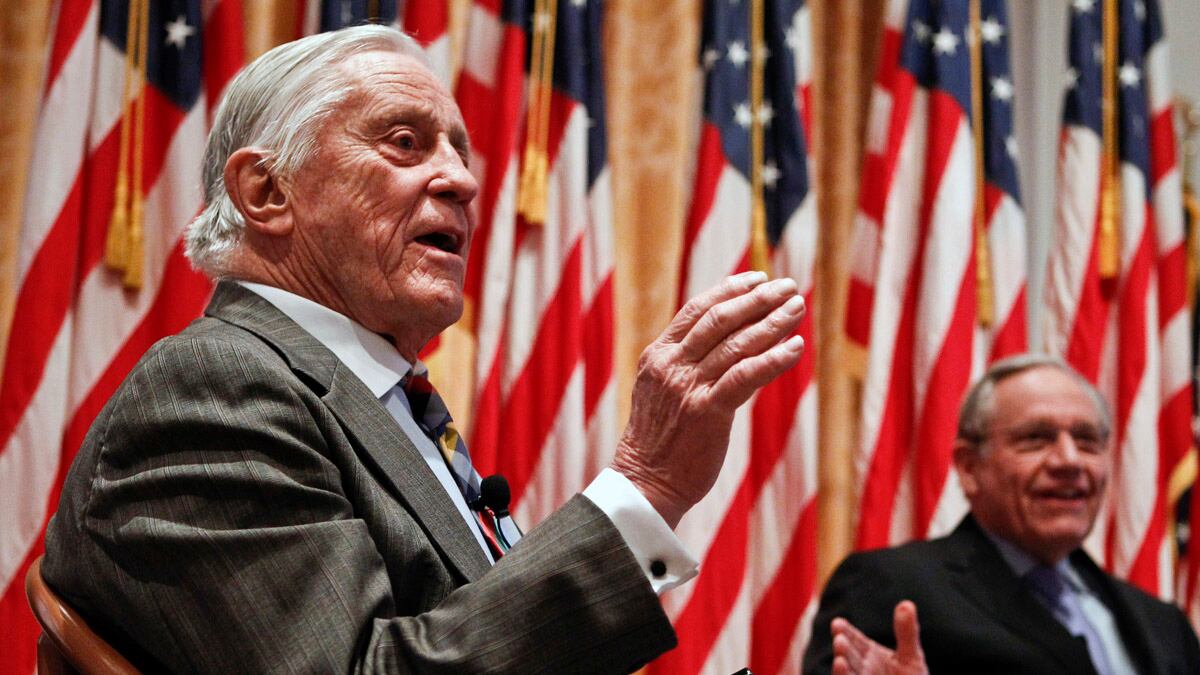Former Washington Post reporter Jeff Himmelman sketches a vivid portrait of the legendary Post editor Ben Bradlee in his new authorized biography, Yours in Truth. Some of the best lines in the book, however, come directly from the pen of Bradlee himself. In letters, memos, and memoranda penned by Bradlee and reprinted in the book, readers encounter the rawest record extant of what it must have been like for Post reporters and editors to roll up their shirtsleeves and enter the trenches with the famed executive editor.
Copy Correction“Dear Mr. Holton,” Bradlee began one letter dated January 3, 1978. “Even though you are still young, very young, let me give you some advice.” Bradlee goes on to give the young scribe the species of advice that is so often skipped over in journalism school. “When you write the editor of a newspaper for a job, other things being equal, you stand a better shot if you spell his name right.”
Letting Off SteamSome of Bradlee’s letters don’t require context to be appreciated. “Dear Frank: I am late in answering your letter,” he begins one message. “It isn’t that I have all that goddamn much on my alleged mind, beyond imminent fatherhood, trying to thwart CBS’s plans to steal Woodward for half a million bucks or thereabouts, worrying about some new raspberry plants I just put in, and generally feeling up to my ass in midgets.”
DisagreeableIn 1985 Bradlee received a letter from the publisher of The Pueblo Chieftain in which the publisher criticized Bradlee for dismissing a study that claimed that the public viewed the press as arrogant. Bradlee’s response, here in full, stands as a reminder to professional contrarians of all stripes that to be liked is nice, but no measure of success: “Editors do run the risk of appearing arrogant if they choose to disagree with anybody who calls them arrogant,” Bradlee wrote. “You sound like one of those publishers who aims to please his pals in the community and give them what they want. No one will call you arrogant that way. No one will call you newspaperman, either.”

WordplayBradlee could be prolix or pithy, as suited his ends. After one Post reader sent along a letter in which he enclosed a crossword puzzle he had filled in backwards, Bradlee responded, “!SNOITALUTARGNOC.”
Intra-Office PunningBradlee tossed off a note to a Mr. Chung in July of 1976 apologized for the Post’s decision to run a cartoon that Bradlee wrote “was not in good taste, and I’m sorry for that.” Bradlee explained that, “We do not censor comics, and I have passed your letter on to Mr. Johnson in care of the syndicate.”
It’s in only the note to one of his employees that Bradlee let his true feelings be known. In a separate letter regarding the note to Chung, Bradlee wrote, “Would you get this letter on to Mr. Johnson, please? The Chinese-Americans have him by the ying-yangs (if you’ll pardon the expression).”
PanacheKnown for his inimitable flair for newsroom leadership, Bradlee received a complimentary letter in 1993 that recounted a time when, after the Post had prevailed in a legal scrap with Mobil Corp., Bradlee had entered the newsroom with his sleeves rolled up and jumped up on a desk with a boombox that was blasting the theme to Rocky. Or so the author of the letter alleged. In his response, Bradlee righted the record.
“That wasn’t the theme from Rocky,” Bradlee wrote. “That was the overture to Die Walkyrie from Honus Wagner’s great grandfather Richard. I had said about that trial that it ain’t over until the fat lady sings. And that was the fat lady singing.”
MeritocracySometimes the letters are about more serious matters, but these messages are just as revealing. Bradlee shouldered the task of making the Post a workplace that welcomed journalists of all backgrounds, but foremost in his mind was maintaining the high quality of the paper’s reporting. In 1972, as a group of black newsroom employees asked questions about why there were so few minorities on staff, Bradlee wrote a letter to top management.
“I believe we should hammer out some affirmative program—hopefully without capital letters. I believe we should do this with all feasible speed … But the quality of this newspaper is the only thing in this world that is important here, and a quota system—for whites, blacks, males, females, Jews, WASPs, old, young, Orientals, Chicanos, Ivy League, Big Ten, North, South—is simply unthinkable.”
SophomoricAfter news broke that reporter Janet Cooke had fabricated a Pulitzer-winning story in the Post, a Yale undergraduate wrote Bradlee, saying that he hoped the editor would “remember this lesson.” The response sent by Bradlee (a Harvard alumnus) is worth quoting in full:
“Dear [student with incredibly WASPy sounding name]:My God, you have gotten pompous at an early age!
Your paraphrased question asks how often do we see the media admit to inaccurate reporting? In the Janet Cooke case, you saw The Washington Post admit to inaccurate reporting. You saw The Washington Post do it before anyone else. You saw The Washington Post do it on the front page. You saw The Washington Post—unasked—return the Pulitzer Prize. There quite literally was no other step I could have taken in the department of autocriticism. Unique in the annals of American journalism. Really.
I am speechless at your injunction that I should remember this lesson and think a bit longer. Before you settle down as a stockbroker or whatever, and join the racquet club or whatever, try to think for yourself, if I may give you a piece of advice.”





